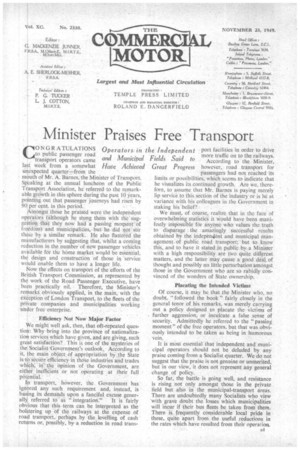Minister Praises Free Transport
Page 27

If you've noticed an error in this article please click here to report it so we can fix it.
ONGR A TULATIONS Operators in to public passenger road transport operators came and Municipal last week from a Somewhat Have Achieved unexpected quarterL-from the mouth of Mr. A. Barnes, the Minister of Transport. Speaking at the annual luncheon of the Public Transport Association, he' referred to the remarkable gawth in this sphere during the past 10 Years, pointing out that passenger journeys had risen by 90 per cent. in this period.
Amongst those he praised were the independent operatbrS (although he stung them with the SuggeStion that they now had a passing moment' of freedom) and Municipalities, but: he did not stir these by a similar remark. He also flattered the manufacturers by suggesting that, whilst a corning reduction in the number of new passenger vehicles available for the home market would be esSeritial, the design and construction of those in "service would enable them to have a longer life.
Now the effects on transport of the efforts of the British Transport Commission, as represented by the work of the Road Passenger Executive, have been practically nil. Therefore, the Minister's remarks. obviously applied, in the main, with the eiception of London Transport, to the fleets of the private companies and municipalities working under free enterprise.
Efficiency Not Now Major Factor We might well ask, then, that oft-repeated question: Why bring into the province of nationalization services which have given, and are giving, such great satisfaction? This is one of the mysteries of the Socialist .Government's outlook. According to it the main object of appropriation by the State is to:Sectit'e7e.fficiency in'tho'se industries and trades which; in' the -opinion of the Government are either inefficient or not operating at their full , potential.
In transport, however, the Government has ignored any such requirement and, instead, is basing its demands upon a fanciful excuse gener ally referred to "integration." It is fairly obvious that this term can be interpreted as the bolstering up of the railways at the expense Of road transport, perhaps by the levelling of cash returns or, possibly, by a reduction in road trans the Independent Port facilities in order to drive Fields Said to more traffic on to the railways. According to the Minister, Great Progress however, road transport for passengers had not reached its limits or possibilities, which.seems to indicate that he visualizes its continued growth. Are we, therefore, to assume that Mr. Barnes is paying merely lip service to this section of the industry or is he at variance with his colleagues in the Government in staking his 'belief?
We Must, of course, realize that in the face of overwhelming statistiCS it Would have been manifestly iriiPosSible for anyone who values the truth to disparage the amazingly successful results obtained by the. indepen4ient and municipal management:of Public road transport.; but to know this, and. to have it stated in public bya Minister with a high responsibilitY are tWo quite differemt matters, and the latter may cause a good deal, of thought and possibly no little perturbation amongst those in the Government who are so rabidly convinced of the wonders of State ownership.
Placating the Intended Victims • Of course, it may be that the Minister who, no doubt, "followed the book" fairly closely in the general tenor of his remarks, was merely carrying out a policy designed to placate the victims of further aggression, or inculcate a false sense of security. Admittedly he referred to the "passing moment" of the free operators, but that was obvimisty intended to be taken as being in humorous vein.
It is most essential that independent and municipal operators should not be deluded by any praise coming from a Socialist quarter. We do not suggest that the praise is not genuine or unmerited, but in our view, it does not represent any general change, of policy.
So far, the battle is going well, and resistance is rising not only amongst those in the private field but also in the municipal-transport areas. There are undoubtedly many Socialists who view with grave doubt the losses which municipalities will incur if :their bus fleets be taken from them. There is, frequently considerable local pride in these, quite: apart from the useful reductions in the rates which have resulted from their operation.




















































































